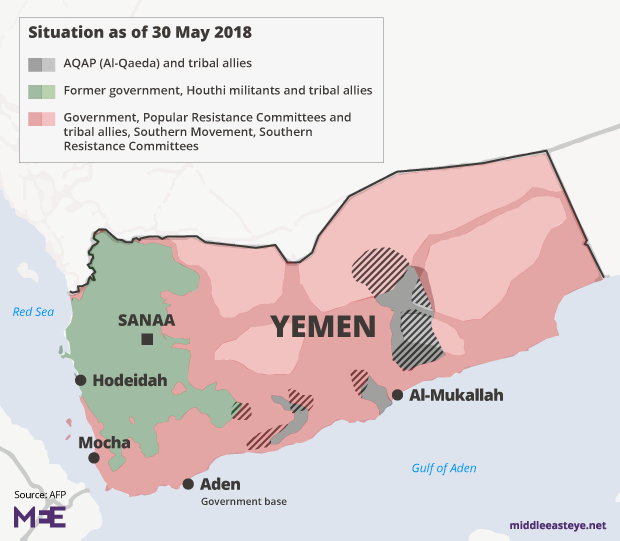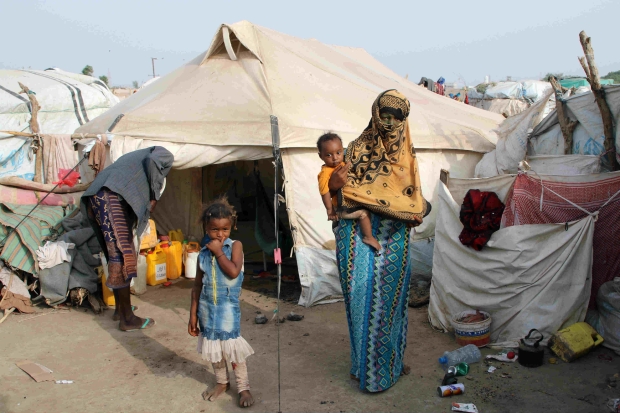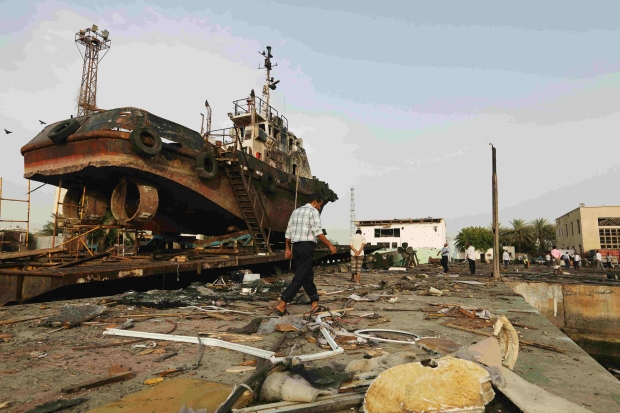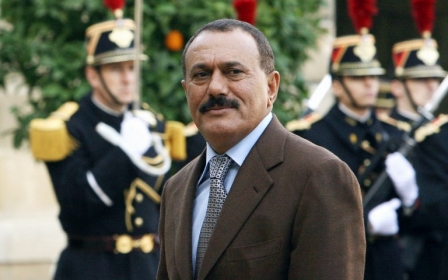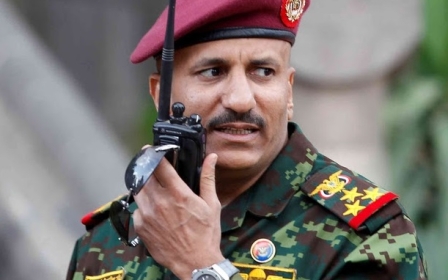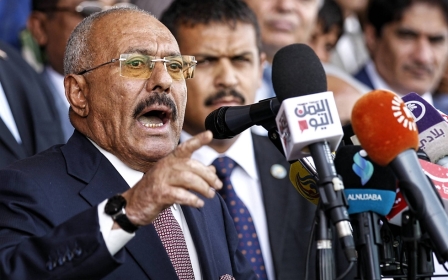Yemen’s Hodeidah braces for blitzkrieg as Tareq Saleh seeks prominence
Taiz, Yemen - Advancing north up the coast, pro-Yemeni government forces led by Tareq Saleh are making lightning-quick progress as they close in on the port city of Hodeida.
Ambulances and military vehicles carry dozens of dead and injured fighters from the frontlines to Hodeida, and the city’s residents feel the war approaching as battleships and warplanes batter Houthi rebel positions.
The city’s loss would be a huge blow to the Houthis, who have used its port as a lifeline.
For the long-suffering people of Yemen, millions of whom are on the brink of famine, fighting in Hodeida could also mean catastrophe - as it is the country's main conduit for aid.
However, for Saleh, nephew of former Yemeni President Ali Abdullah Saleh, the erstwhile Houthi ally who was killed by the rebels as he plotted to turn against them, the victory would give him new status in Yemen and within the Saudi-led coalition backing the internationally recognised government.
Leading from Mocha
Saleh’s involvement in the west coast offensive began after his uncle’s death in December, when he arrived with his forces in the port town of Mocha in Taiz province after fleeing Houthi-controlled Sanaa.
After setting up a military camp in Mocha with the help of the Saudi-led coalition, Saleh began to lead ground operations against the Houthis to the north.
Under his uncle, Saleh’s forces had previously fought the coalition on the Houthis’ side.
Elements of the Saudi-led alliance hold serious reservations about Saleh as a result, yet he has proved effective battling the Houthis, drawing new support.
Talal al-Amari, a fighter in Saleh’s Republican Guard on the western coast, told Middle East Eye that thousands of fighters are joining the commander’s ranks in Mocha, receiving training in military camps before joining the battlefield."Tareq's forces and his allies on the western coast are working according to a clear plan to liberate Hodeida province," he said, promising the fighting will not stop until the strategic port city has been captured.
On Thursday, fierce battles were ongoing around Hodeida airport, which is just 6km from the city.
Ground forces include many brigades fighting under different banners, and are supported by Saudi-led air strikes, but Saleh remains in control of the operation.
"The air strikes have played a major role in helping us to advance and there is no lack of arms on ground, but we are advancing tentatively because of the landmines that Houthis have planted in our way and because we avoid targeting civilians," Amari said.
A city on edge
Residents of Hodeida have heard of plans to retake the city many times over the past three years, but now they sense a final battle is approaching.
"I saw myself the dead and injured fighters in Houthi military vehicles and noticed that the Houthis are not behaving normally,” a Hodeida resident, who wished to remain anonymous due to fears for their safety, told MEE.
“They are withdrawing from the city and heading towards the battlefields."
'Fear has spread in the hearts of Hodeida's residents, as they believe that the war will not have mercy upon them'
- Hodeida resident
The resident said the Houthis will not surrender the city, predicting Hodeida could suffer as Taiz did when that city was retaken by forces loyal to Yemeni President Abd Rabbuh Mansour Hadi.
With Saleh’s pro-Hadi forces drawing near, the resident expressed hope the warring sides would battle far from residential areas and avoid targeting civilians and their houses.
"Fear has spread in the hearts of Hodeida's residents, as they believe that the war will not have mercy upon them."
Aid agencies predict some 200,000 people could be displaced were the fighting to reach the city centre. Around 100,000 have already fled the assault.
Such displacement would gravely exacerbate the already severe humanitarian crisis in Yemen, where at least 10,000 people have been killed in the fighting since war broke out in 2015 and another 2,200 are estimated to have died from cholera.
The threat of famine looms large in the country, where 22 million people are in need of food aid.
Hodeida has been Yemen’s main conduit for commercial and humanitarian aid, with as much as 80 percent passing through its port.
"We expect that those who can afford to leave will do so if and when they absolutely have no other option, but it’s very possible that many could die from the direct or indirect consequences of this fighting before they have the chance," Suze van Meegan, protection and advocacy adviser at the Norwegian Refugee Council, told MEE.
"We are worried that people fleeing will lose access to safe water and be more at risk of cholera. Many will struggle to pay for the cost of transport to safety and have too little money to buy enough food."
"The scale of needs could overwhelm humanitarian organisations – we are already struggling to keep pace with needs across the country," she added.
Houthi confusion
The Houthis have indicated they are not going to leave the city without a fight.
On Sunday night, the rebels’ leader, Abdul Malik al-Houthi, made a speech attempting to rally his forces in the face of Saleh’s assault.
"I call upon Hodeida's residents and all Yemenis to stand together against the invaders of Hodeida," he said, while acknowledging the pro-Hadi forces’ advance.
“Any withdrawal, for whatever reason, does not mean the end of the battle," he said, adding: "The invaders can open a new front in Hodeida but they cannot win it."
'The liberation of Hodeida would mean that the Houthis cannot smuggle any more arms from Iran via the sea'
- Fadhl al-Rabie, political analyst
Fadhl al-Rabie, political analyst and the head of Madar Strategic Studies Centre in south Yemen’s Aden, said the rebel leader’s speech is a clear indication that the Houthis did not expect the attack’s rapidity.
"The Houthis’ leader seemed to be mixed up in his speech, asking his fighters not to be confused and battle the pro-Hadi forces, then saying withdrawal does not mean the end of the war," he told MEE.
According to Rabie, Hodeida will be taken soon from the Houthi rebels, adding that the city’s conquest will vastly limit the rebels’ capabilities.
"The liberation of Hodeida would mean that the Houthis cannot smuggle any more arms from Iran via the sea and that means they will not have the same arms as before,” Rabie added.
“This will lead to the Houthi rebels’ defeat.”
He said taking Hodeida is a priority for the pro-Hadi coalition and that is why forces from different provinces and military units are fighting shoulder to shoulder to conquer the city.
Another reason Saleh’s forces are able to cooperate with the many factions on the western coast is they are all closely aligned with the United Arab Emirates, which is fighting in Yemen as part of the Saudi-led coalition.
Questionable popularity
This is not the case elsewhere in the country, however.
While Saleh may gain support and notoriety with his west coast assault, designs on taking a leading role in parts of the country where groups hold a more circumspect view of him and the Emiratis may prove more difficult.
Abdul Kareem al-Madi, an official in the General People's Congress (GPC), Saleh's party, told MEE that the commander’s UAE-backed forces are planning to confront the Houthis in all rebel-held areas of the country.
“After the liberation of Hodeida, the forces will begin the next step, until they liberate the whole country," Madi said.
According to Madi, fighters from the Tihami resistance – Hodeida residents wanting to oust the Houthis from their city – and militants from south Yemen are happy fighting alongside Saleh and his troops.
Not all parties fighting for Hadi’s government are happy to team up with Saleh, however.
The Islah party, which has ties to Saudi Arabia but is suspicious of the Emiratis, has taken an exception over Saleh and his fighters taking a leading role in the coalition.
Under Saleh’s uncle, the GPC and its armed wing, the Republican Guard - which has fought on the side of the Houthis for the majority of Yemen’s devastating three-year war - made an enemy of Islah.
And even before Ali Abdullah Saleh threw his lot in with the Houthi rebels, Islah was the former president’s chief political opponent during his 22-year rule.
So when Tareq Saleh began to take a leading role in the pro-Hadi forces around Mocha, Islah members took to the streets of Taiz city in protest, condemning the commander as “a killer”.
On Tuesday, protests were seen in Taiz once again, commemorating the Republican Guard assault – led by Saleh – on demonstrators in the city’s Freedom Square during the 2011 uprisings against his uncle’s rule.
Ahmed al-Masani, an Islah supporter, said he and the other protesters demand Saleh stand trial over the violence seven years ago that left at least 20 dead.
"Tareq is a member of the last regime that burnt the square in 2011, so we will keep demanding their [GPC leaders’] trial and there is no excuse that can forgive them. He is a killer - even if he liberates the whole country," Masani said.
Madi points out that Islah has no part in the west coast offensive, and accuses its militants of relaxing in the fight against the Houthis, instead achieving “illusory victories” in order to receive money from the coalition.
He claimed a secret truce had been agreed between Islah and the Houthis after Saleh joined the west coast battlefield, “but the effects of this truce will be reversed by pro-Hadi forces".
Winning support
Despite the uproar in Taiz when Saleh set up camp in Mocha, his recent successes have now turned some critics into supporters.
Hani Ali Abdu protested against Saleh in Taiz last month, but today he changed has his mind.
'Tareq Saleh is a killer of civilians and this is a fact'
- Hani Ali Abdu, Taiz resident
"Tareq Saleh is a killer of civilians and this is a fact. But he has shifted the battle to Hodeida, and this is what others could not do in three years," Abdu said.
"I support him fighting alongside the pro-Hadi forces as he could help them liberate Hodeida and other provinces."
Although Abdu believes Saleh should stand trial for civilian deaths that he says the commander is responsible for, he sees no likelihood of this happening any time soon.
The Taiz resident said the war makes such a trial impossible, and besides, if Saleh is threatened with prosecution he will simply leave the country like his brothers and cousins.
With this in mind, Abdu said, Saleh may as well be welcomed as an effective part of the pro-Hadi coalition.
New MEE newsletter: Jerusalem Dispatch
Sign up to get the latest insights and analysis on Israel-Palestine, alongside Turkey Unpacked and other MEE newsletters
Middle East Eye delivers independent and unrivalled coverage and analysis of the Middle East, North Africa and beyond. To learn more about republishing this content and the associated fees, please fill out this form. More about MEE can be found here.


